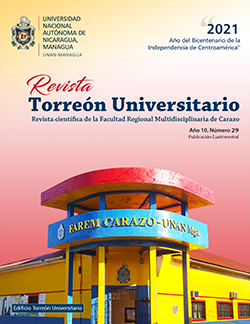Systematization of Educators experience at Cenicsol Therapeutic Community in the treatment of adults addicted to Psychoactive Substances
DOI:
https://doi.org/10.5377/rtu.v10i29.12737Keywords:
Therapeutic Community, educator, psychoactive substance useAbstract
Systematization axis: The experience in the therapeutic community was systematized having as its axis, the reconstruction and critical interpretation of the role of the educator in the treatment of adults with disorders due to the use of psychoactive substances of the Cenicsol residential program. The objective is to develop a critical evaluation of the educator's role in the therapeutic community and in treatment.
Method: The methodology used to systematize experiences of five main moments: the starting point; the initial questions; recovery of the process experienced; the background reflection and finally the arrival points. The instruments applied were the semi-structured interview. The therapeutic director was interviewed; two therapists; three educators and three users from the adult therapeutic community.
Results: The therapeutic community is a drug-free residential environment, it is a highly structured system whose fundamental characteristic is the existence of an artificial pressure system, which obeys the fundamental purpose which is to activate the pathology of the addict in treatment and promote social rehabilitation. The educator is a facilitator of the user's recovery process, coordinates programmed activities of the community and performs therapeutic interventions if necessary. Among the main therapeutic strategies are empathic listening and observation, using cognitive behavioral techniques in individual and group counseling.
Downloads
514
HTML (Español (España)) 311
VISOR (Español (España)) 0
PDF 160
HTML 49
References
Asociación Americana de Psiquiatría (APA). (2014). Manual diagnóstico y estadístico de los trastornos mentales (DSM 5). Arlington: Editorial Panamericana.
Caballo, V. E., Salazar, I. C. & Carrobles, J. A. (2014) (dirs.) Manual de psicopatología y trastornos psicológicos (2ª ed.). Madrid: Pirámide.
Jara, O. (1998). Para sistematizar experiencias. San José: Editorial ALFORJA.
Jara, O. (2012). La Sistematización de Experiencias, práctica y teoría para otros mundos posibles. Bogotá: CINDE.
National Institute on Drug Abuse (NIDA). (2012). Principles of drug dependence treatment. A Research based Guide. (Third Edition). NIH Publication No. 12–4180.
Oficina de las Naciones Unidas contra la Droga y el Delito (ONUDC). (2017). Normas internacionales para el tratamiento de trastornos por el uso de drogas. Ginebra: ONUDC.
Organización Mundial de la Salud (OMS). (2004). Neurociencia del consumo y dependencia de sustancias psicoactivas. Maryland: OMS.
Published
How to Cite
Issue
Section
License
Copyright (c) 2021 Universidad Nacional Autónoma de Nicaragua, Managua

This work is licensed under a Creative Commons Attribution-NonCommercial-NoDerivatives 4.0 International License.
Los autores que publican en esta revista están de acuerdo con los siguientes términos.
- El autor o los autores de los artículos, ensayos o investigaciones conceden a la Universidad Nacional Autónoma de Nicaragua, Managua (UNAN-Managua) los derechos de edición (copyright) del trabajo enviado, por consiguiente la Universidad cuenta con el derecho exclusivo para publicar el artículo durante el periodo completo de los derechos de autor.
- Estos derechos de autor/ autores autorizan a la Revista Torreón Universitario y a la Universidad editar y divulgar/publicar el artículo en dicha Revista, incluyendo reproducción impresa y electrónica, el almacenamiento, recuperación y cualquier otro tipo de publicación, y fuentes de información secundaria como servicios de resúmenes y bases de datos, así mismo la facultan a proteger el artículo contra el uso no autorizado para su difusión por medios impresos o electrónicos (PDF, HTML, EPUB, XML u otros).
Licencia para el uso del contenido
La revista hace uso de la Licencia Creative Commons Atribución-NoComercial-SinDerivar 4.0 Internacional.
Bajo esta declaración:

Este revista está sujeta a una licencia de Creative Commons Reconocimiento-NoComercial-SinObraDerivada 4.0 Internacional. Puede ser copiada, distribuida y transmitida públicamente siempre y cuando se cite al autor y la fuente (Revista Torreón Universitario), no debe modificarse ni utilizarse con ningún fin comercial. La licencia completa se puede consultar en http://creativecommons.org/licenses/by-nc-nd/4.0/.



